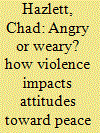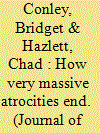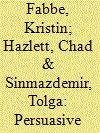| Srl | Item |
| 1 |
ID:
172328


|
|
|
|
|
| Summary/Abstract |
Does exposure to violence motivate individuals to support further violence or to seek peace? Such questions are central to our understanding of how conflicts evolve, terminate, and recur. Yet, convincing empirical evidence as to which response dominates—even in a specific case—has been elusive, owing to the inability to rule out confounding biases. This article employs a natural experiment based on the indiscriminacy of violence within villages in Darfur to examine how refugees’ experiences of violence affect their attitudes toward peace. The results are consistent with a pro-peace or “weary” response: individuals directly harmed by violence were more likely to report that peace is possible and less likely to demand execution of their enemies. This provides microlevel evidence supporting earlier country-level work on “war-weariness” and extends the growing literature on the effects of violence on individuals by including attitudes toward peace as an important outcome. These findings suggest that victims harmed by violence during war can play a positive role in settlement and reconciliation processes.
|
|
|
|
|
|
|
|
|
|
|
|
|
|
|
|
| 2 |
ID:
178735


|
|
|
|
|
| Summary/Abstract |
Understanding how the most severe mass atrocities have historically come to an end may aid in designing policy interventions to more rapidly terminate future episodes. To facilitate research in this area, we construct a new dataset covering all 43 very large mass atrocities perpetrated by governments or non-state actors since 1945 with at least 50,000 civilian fatalities. This article introduces and summarizes these data, including an inductively generated typology of three major ending types: those in which (i) violence is carried out to its intended conclusion (37%); (ii) the perpetrator is driven out of power militarily (26%); or (iii) the perpetrator shifts to a different strategy no longer involving mass atrocities against civilians (37%). We find that international actors play a range of important roles in endings, often involving encouragement and support for policy changes that reduce mass killings. Endings could be attributed principally to armed foreign interventions in only four cases, three of which involved regime change. Within the cases we study, no ending was attributable to a neutral peacekeeping mission.
|
|
|
|
|
|
|
|
|
|
|
|
|
|
|
|
| 3 |
ID:
164558


|
|
|
|
|
| Summary/Abstract |
Civilians who have fled violent conflict and settled in neighboring countries are integral to processes of civil war termination. Contingent on their attitudes, they can either back peaceful settlements or support warring groups and continued fighting. Attitudes toward peaceful settlement are expected to be especially obdurate for civilians who have been exposed to violence. In a survey of 1,120 Syrian refugees in Turkey conducted in 2016, we use experiments to examine attitudes towards two critical phases of conflict termination – a ceasefire and a peace agreement. We examine the rigidity/flexibility of refugees’ attitudes to see if subtle changes in how wartime losses are framed or in who endorses a peace process can shift willingness to compromise with the incumbent Assad regime. Our results show, first, that refugees are far more likely to agree to a ceasefire proposed by a civilian as opposed to one proposed by armed actors from either the Syrian government or the opposition. Second, simply describing the refugee community’s wartime experience as suffering rather than sacrifice substantially increases willingness to compromise with the regime to bring about peace. This effect remains strong among those who experienced greater violence. Together, these results show that even among a highly pro-opposition population that has experienced severe violence, willingness to settle and make peace are remarkably flexible and dependent upon these cues.
|
|
|
|
|
|
|
|
|
|
|
|
|
|
|
|